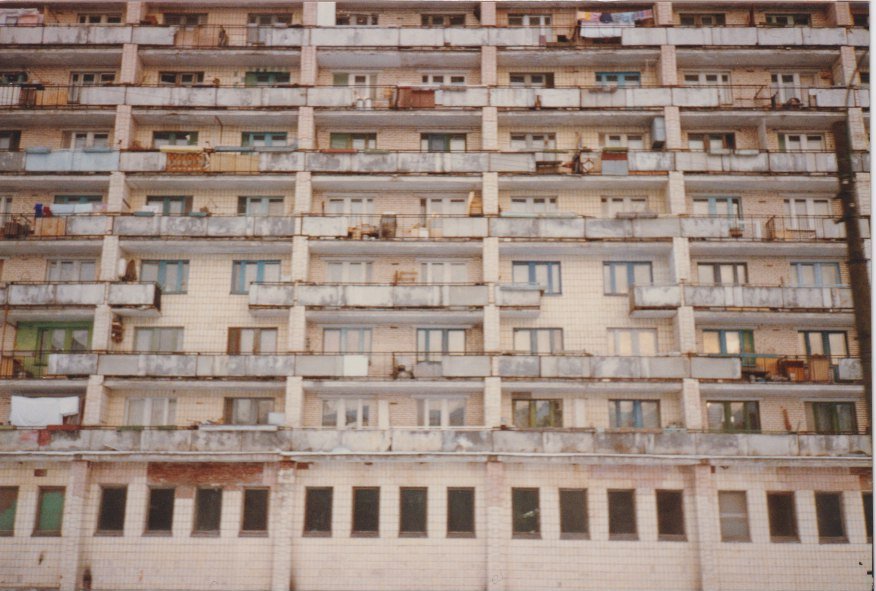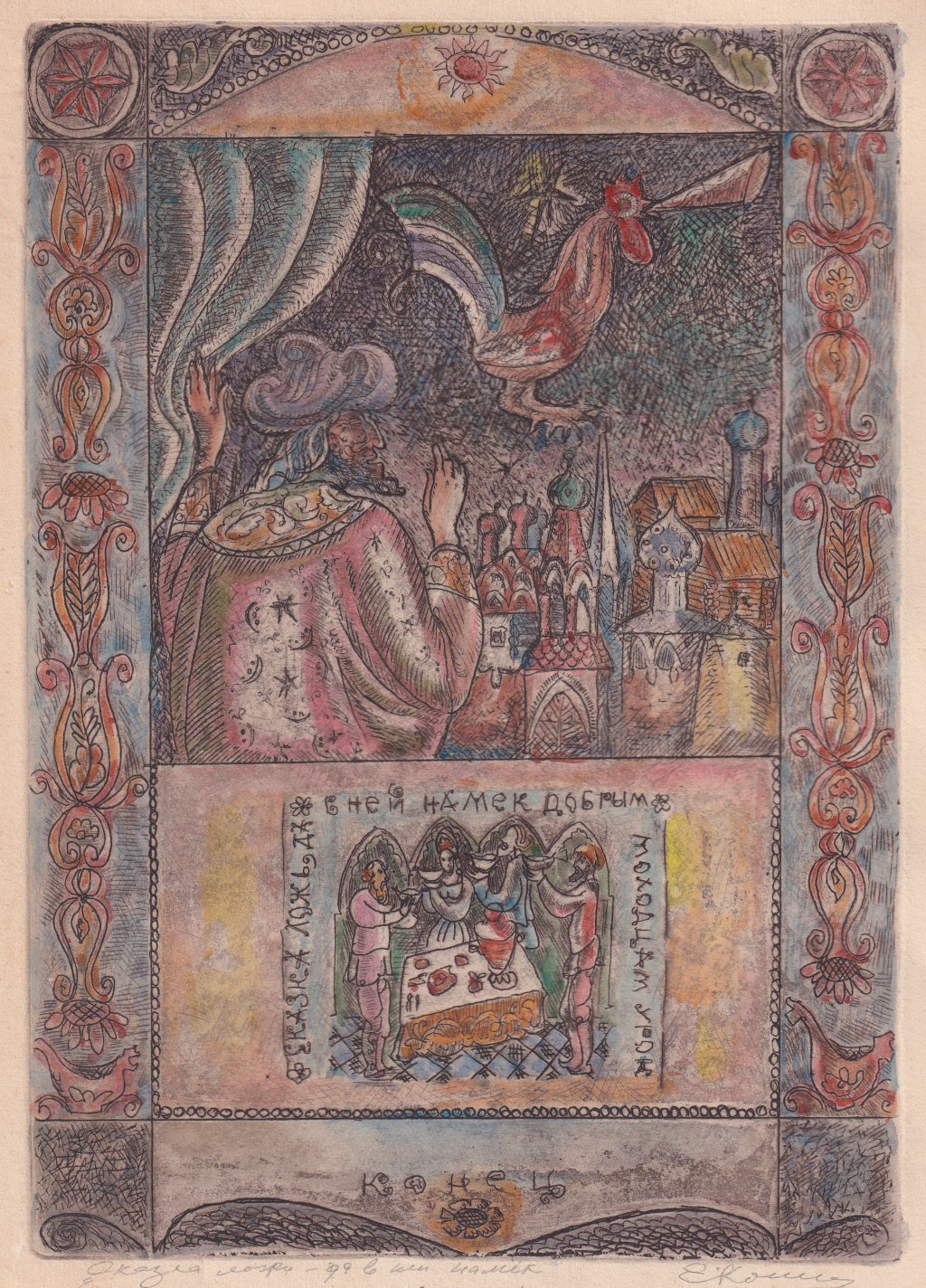
A letter from Leningrad
In the 1980s, President of the Soviet Union Mikhail Gorbachev introduced policies of perestroika (reform) and glasnost (openness), which made short-breaks from the UK to Moscow and Leningrad (now St Petersburg) possible for the first time. A friend and I booked immediately, and discovered that travelling beyond ‘the Iron Curtain’ was as disorientating as it was thrilling.
I’ve been in the Soviet Union for a day. Weird!
Jess and I are staying in a hotel in the middle of Leningrad that has the aesthetics of Crossroads Motel but is the size of the Birmingham Exhibition Centre.
When we arrived on our tour coach at 11pm last night, the late-winter streets were deserted apart from a few grim-looking figures hunched under fur hats. On the drive, I stared at massive Soviet apartment blocks with dirty balconies and anonymous buildings with words spelled out in neon lighting on their roofs - all in the Cyrillic alphabet. What were they? Shops? Businesses? Hotels? There were no window displays or activity so I couldn’t tell.
We clambered off the coach at our hotel, a mighty concrete beast by the Gulf of Finland, and the first thing we saw was a Levi’s and Burberry shop at the entrance. Capitalism has got here before us! In the foyer there were girls who were obviously prostitutes - a bit younger than us, about 18, and looking Stringfellows smart but drab at the same time. I was in my Camden Market ‘finery’ so we were all eyeballing each other.
After we’d been checked in by our tour guide, two men - not staff - followed us down labyrinthine corridors and tried to carry our bags to our hotel room with us. They were laughing and sounded like they were talking dirty in Russian. I was quite worried about that so once we were inside I wedged a tilted chair against the door. Unpacking my suitcase, I was delighted to still have the bag of carrots I’d brought for vitamins. It was forbidden to bring in food, and there’d been an “eek” moment when their unmistakable outline had shown quite clearly on the scanner at the airport. The security guard had just caught my eye and smiled. Jess has brought make-up to give to any Soviet women we make friends with.
I laid awake for three hours too excited to sleep. When we woke up in the morning, the bedroom door was slightly ajar but the chair had done its job.
In daylight, Leningrad looked elegantly laid out with wide boulevards awash with pastel colours made dreary by the slush. It’s freezing - well below freezing actually - with an icy blast scampering in from the Gulf of Finland. On the main street Nevsky Prospekt old women were pointing at my bare head in concern.
First stop, the Hermitage Art Museum via deep metro stations that were astonishngly beautiful, like whiffy cathedrals. The Hermitage drowned us in baroque staircases, preposterous crystal chandeliers and walls of religious paintings guarded by elderly women who literally moved us into the correct position from which to view each work of art. Just as we thought we were getting a quiet moment with a golden dragonfly or an unexpected Picasso, we’d hear the squeak of their sensible shoes behind us and start shuffling obediently onwards. I was constantly drawn to the huge arched windows and views of people milling around outside. Children were playing in the snow on the spot where revolutionaries had stormed the Winter Palace in 1917.
Back on the streets, we looked for a cafe but couldn’t see anything but vague activity through grimy windows. How to identify one? Eventually, as a man opened a door and as he walked inside I could see over his shoulder that we’d found our goal. It was a basic room with a big urn of tea and a plate of hard-boiled eggs and another of doughnuts on a counter. We had tea, although the woman serving kept pointing and saying “coffee”, and a doughnut. We thought it was very cheap when our smallest note - 1 rouble - was enough, but then Jess got called back (by everyone!) and given almost as much in change as we’d given. The first bite of the doughnut was a surprise. It turned out to have meat inside, pale and gristly. Could it have been something like brain?
There were no chairs, just high tables, so we stood. Other customers were staring curiously and a couple looked a bit hostile to be honest. Three pale teenage boys at the next table very nervously tried to sell us a badge with a picture of Lenin on it. Jess offered them a cigarette and a light, and they asked if they could keep the box of matches. They chatted with us for a while in very decent English; they said they always tried to speak to foreigners in order to practice. “I don’t believe in perestroika,” said one quite pompously. “I know, I live in the Soviet Union.”
The boys came out into the street with us when we left and pointed out a few buildings of interest, although they didn’t really show any enthusiasm. Then they saw a car that they claimed had police in it and said they’d be taken away if they didn’t go immediately, which seemed a bit dramatic.
We walked on and on past canals and onion-domed churches, notably the Church of the Saviour on Spilt Blood which was built over the bloodstain left after the assassination of Alexander II. We got a bit wide-eyed over that episode of history O-level coming to life. Eventually we recognised Nevsky Prospekt again. There was a queue in the street that turned out to be for wellington boots. We went into a vast, historic-looking department store. But there was nothing to buy in there except clothes that looked like they were from the early 70s laid out on old trestle tables . It smelled very musty, like decay. “It’s the people as well as the building,” whispered Jess rudely. I ended up buying a picture of a Russian fairytale (I think) in brightly coloured ink from an artist who had a little stall on the street.
Then a lovely thing happened. A toddler whose mother had him padded out like a Michelin man tripped over into the snow and gave a squawk. Immediately every man and woman nearby rushed over, helped to pick him back up and made a fuss of him, as if he was everybody’s child. For a moment we were all smiles together.
Back at the hotel, a small wedding party of about 10 had set up by a shallow fountain in the marble hallway. I’m guessing this would be a hugely expensive thing to do, but it’s hard to compute how wealthy or fashionable people are here by their appearance.
Through an open door into a large concert hall, I could see a cabaret performance in progress. Men and women in sparkling leotards were throwing each other into artistic poses. A band was playing, the guitarist wearing a blue spangled suit with flared trousers, and there was some energetic dancing going on in the audience. A drunk man with a beard gestured at me to come in and dance with him, so Jess and I scuttled back to our room for a bit of peace and warmth.
We ate dinner in the hotel’s cavernous dining room - I think it was three storeys high - which was pretentiously decorated. I counted seven shades of blue. We have to eat every meal with the other people on the tour. They’re all here via an advertisement in The Guardian: older couples in which the husband and wife resemble each other, but seem edgy and brittle as if they really dislike each other. One of them told a story about going to Moscow a few months earlier. He’d joined what he thought was a queue for groceries in order to experience true deprivation, shuffled along for a full two hours, then ended up at the Soviet Union’s first McDonald’s. Everyone snorted and nodded. They LOVED this story.
Our dinner was already on plates laid out on catering trolleys by our table when we got there, so it was barely lukewarm. I identified: pickled cabbage, pâté, a cutlet made of minced turkey or chicken with rice and then a sort of shortbread-y desert. The tour guide told us that the best food comes straight to the tourist hotels; the people have no fresh milk, cheese, sugar, fruit or vegetables. The Guardian readers agonised over all of this while their dinner dropped another couple of degrees in front of them. “Right,” I said brightly and tucked in.
From behind a high, pleated screen, more live music was playing - but it was always Lambada over and over again. Every time the song finished, the hidden musicians simply dived straight back into the introduction and we were off to to the Brazilian dancehalls again. Feedback rattled the ginormous speakers. After dinner, the waiters came over en masse and asked us to change money with them, which we did although I can’t see what we’ll spend it on. One of them went from table to table trying to sell a watch. I actually started to feel guilty for coming here..
Back in our room again, we’re watching a strange programme on our (black and white) TV. A man is singing, his face half hidden by shadows, and his performance is intercut with what looks like bits of documentaries: WWII soldiers digging in the snow and a woman lying naked among leaves. What the heck is going on? It’s all making my heart beat a bit too fast.
